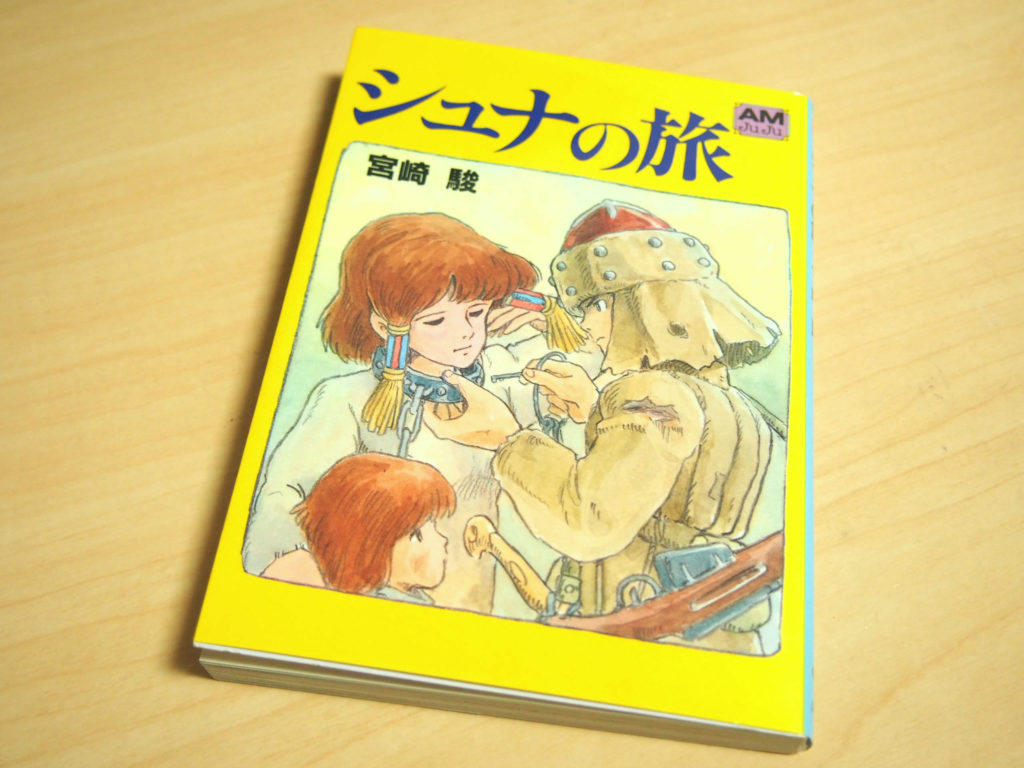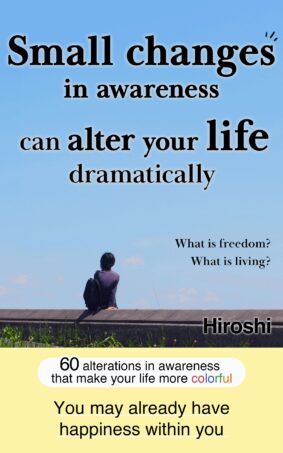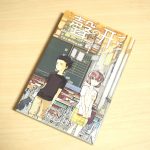Review of Shuna’s Journey By Hayao Miyazaki!

Have you ever heard of Shuna’s Journey?
It’s the work by Hayao Miyazaki but not famous like other Ghibli works like Princess Mononoke, Spirited Away, My Neighbor Totoro, etc.
I read it about 15 years ago, maybe right after graduation of University and I was looking for an interesting book at a kind of subculture store and found it!
I read it a bit on the spot and decided to buy as it was very interesting.
Interesting point is about 5 years ago, I happened to encounter with this book again when I ordered a secret menu at a unique book cafe in Ikebukuro.
They serve one menu with a book which is secret.
I wondered what kind of book come and to my very surprise, the secret book came in front of me was Shuna’s Journey.
It is manga and not made into an anime movie, so I’ll introduce you the story and review.
※This article includes spoiler, so if you do not want, I’m glad you come back here after reading Shuna’s Journey
- 1. Short Summary
- 2. Review
- 2.1. Unpredictable Action of Shuna
- 2.2. Is action by Shuna really right?
- 2.3. Strong Mind of Thea
- 2.4. Talk with a man like Jigo of Princess Mononoke
- 2.5. Existence of God-Folk
- 2.6. Bravery of Shuna
- 3. Original Concept from The Prince who became a Dog
- 4. Shuna’s Journey English Ver. Released November 2022!
Short Summary
Long time ago, there was a small kingdom at the bottom of the valley.
People were poor but lived gratefully for the small harvest.
Prince of the kingdom Shuna thought what a sad poor life and what a beautiful but harsh nature.
One day, Shuna finds an old traveler lying on the ground.
Traveler shows seeds of grain which is already dead and tells Shuna that he is traveling to find the living seed.
He was once a prince of a small country like Shuna but to rescue the poor people in his country he set out on a journey to get the living seed.
Shuna got the dead seed and he also set out on a journey to find the living seed.
After his long journey, what he saw was…
Review
Unpredictable Action of Shuna
First, Shuna’s action was a kind of surprise to me.
Here, surprise means as a character made by Hayao Miyazaki..
Certainly people living there were poor but at least they felt gratefulness for the harvest.
The elders also say if that’s the destiny even if we are poor, dying here is also our way.
But Shuna said “what a sad poor life”.
He doesn’t have a good impression on his country.
In the end, he ignores all the advice of his father and elderlies and set out on a journey.
Shinto and Japanese culture choose to live with nature instead of conquer nature.
This is my private view but I felt like works by Hayao Miyazaki treasure this rules of nature and each main character in his works treasures that part at least.
Even though poor they are, they help each other and live with thankfulness even if that’s a poor harvest, that kind of part they treasure I felt.
But I felt action and thoughts of Shuna were opposite.
Just one point was common.
That was the action he took to rescue others.
Not for himself but for others, to rescue people in his kingdom, he set on a journey.
He doesn’t care taking any risk for that and this point is common in all the works by Hayao Miyazaki, I felt.
Is action by Shuna really right?
There were some scenes in which I wondered if actions by Shuna were really right.
First, he attacked merchants who were selling slaves.
Of course, I understand he can not forgive those people ethically.
Still, when he had been spoken to a merchant if he could buy the slaves and couldn’t make it, he gave up and left the place.
That is, he first tried to free the slaves by buying them under the official rules (in this world) without resorting to the power and assault.
But he threatened the merchant by putting the edge of his sword to the merchant’s neck to free them in the end and that’s the opposite way of the first action of his.
Not only that, he assaulted a cart carrying slaves and killed traffickers.
I think this scene is the first time Shuna killed human.
Aside from right or wrong, Shuna threatened and killed people at least.
I understand it if the situation was like lives of slave hang in the balance or his life was at risk but he attacked voluntarily in this case.
Trafficking slaves is unforgivable but was Shuna really right?
Wasn’t there any other way?
Next point I felt something was the part he robbed seeds in the end.
This is also an obvious predatory act.
Stepping in the land where humans were not allowed to enter and run away after ripping the plant out there.
Actually, the moment he ripped out the plant, an acute pain tore through his heart.
In the end, he loses all the memories he had.
This might have been the price he paid for it.
Strong Mind of Thea
When Shuna had wavering feelings when the merchant asked him of buying slaves, Thea shouted at Syuna he would also be captured if he sold his weapon, adding she didn’t want even Shuna to buy her.
Without really strong heart, no one can make such a remark, I thought.
She was promised to be free from the servitude at least but she rejected it on her own.
Top of it, she made an extra disadvantageous remark saying she does’t want to be bought even by Shuna.
If this had occurred in our real world, most of us could not do, I think.
Making such remark is very difficult without much pride and strong heart.
Of course, this is the world of manga, so it’s possible, still I think this kind of decision we have to make in our life regardless of its scale occurs even if the situation is different.
No one blames you and that’s not a bad thing even if you didn’t say, move, but.
This kind of situation, most of us encounter, I think.
In a way, only in such a moment, real value of that person is being put to the test, I feel.
Thea was a girl who never throw away her pride of heart even if she became a slave.
Nobody can rule her in the real meaning, I felt.
Talk with a man like Jigo of Princess Mononoke
What? Jigo?
A man who looks like Jigo of Princess Mononoke appears in Shuna’s Journey.
Rather, his character and role are almost Jiko.
This elderly person tells Shuna the place where seeds exist.
What I paid attention was just a small talk between Shuna and this elderly person.
Shuna thought this guy knew the place of seed, so asked him eagerly.
But the elderly person tells “Give me a naan before that”.
I felt this is really true.
If you want something, you give something first.
People often become like I want, I want, sometimes although it can not be helped as we are human after all.
We tend to prioritize our profit before others.
If you just live unconsciously without thinking, you tend to do such things, rather, adults often do it, too.
Point is those people do such a thing unconsciously like the case of Shuna.
They, sometimes including me, don’t notice they prioritize themselves.
Simply put, it’s the difference of Giver who can give something to others and Taker who always work hard to get something from others
I felt this elderly person told (although he didn’t say anything directly) Shuna this very simple thing in this small talk.
Privately, I felt I wanted to be Giver regardless of whether I can get something or not.
Existence of God-Folk
God-Folks were the ones who had the seeds in the end
God-Folks gave the seeds to the humans in return for humans who had been sold by humans.
Slaves, who were bought by Traffickers, had been sold to God-Folks.
Humans grew seeds and plants once but now only God-Folks keep the seeds.
What humans have was dead seeds which were given by God-Folks now.
I feel this contains various metaphors.
Humans who lost, forgot the original way of living and irony of selling humans by same human race as a price.
We might be able to put those things to various incidents which occur in our real world.
If we focus on seeds, that’s native seeds which exist since old days only in the area.
If we focus on our lifestyle, mass-consumption society rather than fixing and making on our own hands.
Communication of social media instead of face-to-face conversation.
Something gained, something lost.
Was that something we gained dead seeds or…
Bravery of Shuna
I feel Shuna is a person who acts emotionally using right brain rather than left brain.
There are cases I can not say his action is right or wrong.
Still, he acts.
He acts even if he risks his life.
I thought this is just incredible.
I can not act like him if that means risk my life, actually.
For Shuna, something to accomplish overwhelms taking his life.
That old man like Jigo also told him he can go back home anytime as cozy, free life as a prince awaits for him.
But, he chose to keep going.
In the closing days of his journey, he notices he is in a very peaceful world.
Blessed with nature and foods.
World of no creatures that threaten or being threatened.
I think this is the world he was looking for.
He can live happily rest of his life if he stays there without going outside.
No need to fight.
No need to hurt or being hurt.
And yet, he left there and set out on his journey in the end.
He did so just for something he wanted to accomplish.
There are many risks in life and there is security by staying inside as well.
There is no answer like which is right but Shuna kept going even at risk to his life for something he wanted to accomplish.
Those who accomplish something might be the ones who can move with such a strong will.
What could Shuna accomplish in the end.
Original Concept from The Prince who became a Dog
It was written in the postscript and it looks like the story was made based on Tibetan folk song “The Prince who became a Dog”.
In this The Prince who became a Dog, the prince who stole grains of wheat turned into a dog instead of losing memories like Shuna.
Now finally the mystery of Shuna’s action was not something appeared in the main characters by Hayao Miyazaki was solved.
Shuna’s Journey had its original draft and I think the story developed based on it as much as possible.
It was not a perfect original work like Nausicaa of the Valley of the Wind and Princess Mononoke, etc.
Both endings after that, Shuna’s Journey and The Prince who became a Dog, are also similar.
In Shuna’s Journey, the seeds which Shuna brought back were not revealed after all but in The Prince who became a Dog, it was clearly revealed as “Wheat”.
Tibet is the country where staple food is wheat and this The Prince who became a Dog must have made factoring in its real history.
Shuna’s Journey English Ver. Released November 2022!
Finally, Shuna’s Journey was translated into English and release November 2022.
Publisher is First Second in United Kingdom.
It’s a hardcover book.
I checked price on Amazon US and it was about $20.
I’m very interested in how the translation is.
And I’m also very glad that Ghibli fans in overseas could notice this Shuna’s Journey as it is not famous at all like other Ghibli films in overseas.
8 Popular Souvenir at Ghibli Museum Gift Shop 2019!
Impressive Quotes of Princess Mononoke with Japanese
Review of Nausicaa of the Valley of the Wind!
Meaning of Ghibli’s Movie “The Boy and the Heron” in Japanese and English












